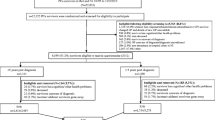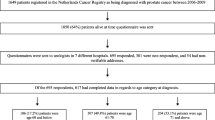Abstract
Inasmuch as treatments for advanced prostate cancer may have identical clinical outcomes but very different meanings to patients, we sought to compare the impact of surgical and medical castration (orchiectomy versus injected goserelin acetate Zoladex®) on quality of life and psychosocial status. A total of 147 men with Stage D prostate cancer participated in the study: 115 selected treatment with goserelin acetate, and 32 chose orchiectomy. Quality of life, as measured by the Functional Living Index: Cancer (FLIC), improved at both the 3 and the 6 month follow-up in the goserelin acetate group (p=0.0001), but did not change from baseline at 6 months in the orchiectomy group (p=0.54). These findings were paralleled by improvement from baseline in psychosocial status, as measured by the Profile of Mood States (POMS), at 6 month follow-up (p=0.01 in the goserelin acetate group versus p=0.60 in the orchiectomy group). This investigation, which is among the first to evaluate patients' appraisals of their lives following treatment choices for advanced prostatic cancer, argues compellingly for including quality of life in assessments of therapy.
Similar content being viewed by others
References
American Cancer Society. Cancer facts & figures—1992, Atlanta, ACS, 1992.
Peeling WB. Phase III studies to compare goserelin (Zoladex®) with orchiectomy and with diethylstilbestrol in the treatment of prostatic carcinoma. Urology 1989; 33(suppl 5): 45–52.
Cassileth BR, Soloway MS, Vogelzang NJ, et al. Patients' choice of treatment in stage D prostate cancer. Urology 1989; 33(suppl 5): 57–62.
Johnson JR, Temple R. Food and Drug Administration requirements for approval of new anticancer drugs. Cancer Treat Rep 1985; 69: 1155–1157.
Tannock I, Gospodarowicz M, Meakin W, et al. Treatment of metastatic prostatic cancer with low-dose prednisone: evaluation of pain and quality of life as pragmatic indices of response. J Clin Oncol 1989; 7: 590–597.
Presant CA, Soloway MS, Klioze SS, et al. Buserelin treatment of advanced prostatic carcinoma. Long-term follow-up of antitumor response and improved quality of life. Cancer 1987; 59: 1713–1716.
Parmar H, Phillips RH, Lightman SL, Edwards L. How would you like to have an orchiectomy for advanced prostatic cancer? Am J Clin Oncol (CCT) 1988: 11 (suppl 2): S160-S168.
Smith JAJr. Palliation of painful bone metastases from prostate cancer using sodium etidronate: results of a randomized, prospective, double-blind, placebo-controlled study. J Urol 1989; 141: 85–87.
Fowler FJ, Wennberg JE, Timothy RP, et al. Symptom status and quality of life following prostatectomy. JAMA 1988; 259: 3018–3022.
Schipper H, Clinch J, McMurray A, Levitt M. Measuring the quality of life of cancer patients: the functional living index—cancer. J Clin Oncol 1984; 2: 472–483.
Cassileth BR, Lusk EJ, Brown LL, Cross PA. Psychosocial status of cancer patients and next of kin: normative data from the Profile of Mood States. J Psychosoc Oncol 1985; 3: 99–105.
Selby P, Robertson B. Measurement of quality of life in patients with cancer. Cancer Surv 1987; 6: 521–543.
Barofsky I, Sugarbaker PH. Cancer. In: Spilker B, ed. Quality of Life Assessments in Clinical Trials. New York: Raven Press, 1990: 419–439.
Shumaker SA, Anderson RT, Czajkowski SM. Psychological tests and scales. In: Spilker B, ed. Quality of Life Assessments In Clinical Trials. New York: Raven Press, 1990: 95–113.
Aaronson NK. The assessment of subjective response in prostatic cancer clinical research. Am J Clin Oncol 1988; 11(suppl 2): S43-S47.
Fosså SD, Aaronson NK, Newling D, et al. Quality of life and treatment of hormone resistant metastatic prostatic cancer. Eur J Cancer 1990; 26: 1133–1136.
Presant CA, Soloway MS, Klioze SS, et al. Buserelin treatment of advanced prostatic carcinoma. Long-term follow-up of antitumor response and improved quality of life. Cancer 1987; 59: 1713–1716.
Kiebert GM, deHaes JCJM, van deVelde CJH. The impact of breast-conserving treatment and mastectomy on the quality of life of early-stage breast cancer patients: a review. J Clin Oncol 1991; 9: 1059–1070.
Author information
Authors and Affiliations
Consortia
Rights and permissions
About this article
Cite this article
Cassileth, B.R., Soloway, M.S., Vogelzang, N.J. et al. Quality of life and psychosocial status in stage D prostate cancer. Qual Life Res 1, 323–330 (1992). https://doi.org/10.1007/BF00434946
Received:
Accepted:
Issue Date:
DOI: https://doi.org/10.1007/BF00434946




